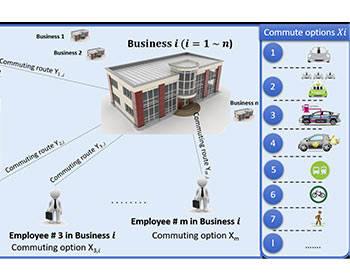MPC Research Reports
Report Details
Abstract
 The transportation sector in the United States is currently dealing with several challenges, such as greenhouse gas (GHG) and air pollution emission increases, parking facility costs, congestion, and energy consumption. The present report focuses on the development of an innovative multi-business commute optimization system (MBCOS) to provide a new means of resolving the aforementioned challenges and increase efficiency in transportation systems. MBCOS consists of three integrated components: a website (www.commuteopt.com), a travel attributes model, and a multi-objective optimization model. The website is designed to facilitate the collection of travel data and delivery of recommended plans. The travel attributes model is designed to calculate attributes such as travel time, cost, GHG and air pollution emissions, energy use, and calories for all commuting options. MBCOS is designed to model commute options, including drive-alone, carpool, use of public transit, bike, walk, and combinations of these modes. The optimization model is designed to identify optimal commute plans for each employee in a business to minimize GHG and air pollution emissions while complying with commute needs, preferences, and convenience. A case study of 47 employees is presented to evaluate system performance and demonstrate its capabilities. Results show that the developed system is capable of reducing the total GHG and air pollution emissions up to 23.4% compared with reported commute behavior. Furthermore, recommendations generated by the model show promising and practical solutions that can successfully contribute to a reduction of transportation emissions. Finally, brief widespread application of the system in Colorado and the United States is analyzed to document its potential benefits on a large-scale application.
The transportation sector in the United States is currently dealing with several challenges, such as greenhouse gas (GHG) and air pollution emission increases, parking facility costs, congestion, and energy consumption. The present report focuses on the development of an innovative multi-business commute optimization system (MBCOS) to provide a new means of resolving the aforementioned challenges and increase efficiency in transportation systems. MBCOS consists of three integrated components: a website (www.commuteopt.com), a travel attributes model, and a multi-objective optimization model. The website is designed to facilitate the collection of travel data and delivery of recommended plans. The travel attributes model is designed to calculate attributes such as travel time, cost, GHG and air pollution emissions, energy use, and calories for all commuting options. MBCOS is designed to model commute options, including drive-alone, carpool, use of public transit, bike, walk, and combinations of these modes. The optimization model is designed to identify optimal commute plans for each employee in a business to minimize GHG and air pollution emissions while complying with commute needs, preferences, and convenience. A case study of 47 employees is presented to evaluate system performance and demonstrate its capabilities. Results show that the developed system is capable of reducing the total GHG and air pollution emissions up to 23.4% compared with reported commute behavior. Furthermore, recommendations generated by the model show promising and practical solutions that can successfully contribute to a reduction of transportation emissions. Finally, brief widespread application of the system in Colorado and the United States is analyzed to document its potential benefits on a large-scale application.
How to Cite
Abdallah, Moatassem, Caroline M. Clevenger, and Shahryar Monghasemi. Multi-Business Commute Optimization System: System Development and Pilot Case Study, MPC-21-431. North Dakota State University - Upper Great Plains Transportation Institute, Fargo: Mountain-Plains Consortium, 2021.

